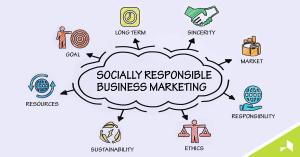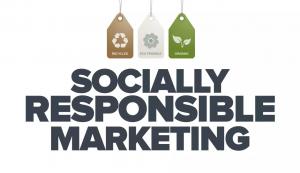
Marketing is a dynamic field that constantly evolves to adapt to changing consumer behaviors, technological advancements, economic shifts, and cultural trends. Over time, marketing has moved from traditional to digital marketing, one-size-fits-all to highly personalized and data-driven marketing. Now, brands are focused on socially responsible marketing as the younger generations, such as Millennials and Generation Z, are particularly attuned to social and environmental issues. Socially responsible brands are more likely to resonate with these consumers, attracting a new and growing customer base.
Socially responsible marketing definition
Wondering what is socially responsible marketing? We have the answer for you. Socially responsible marketing, also known as ethical marketing or sustainable marketing, is a marketing approach that goes beyond traditional strategies focused solely on profit and sales. It involves incorporating social and environmental considerations into marketing practices to make a positive impact on society and the planet. It takes a holistic approach that considers the well-being of various stakeholders and embraces ethical, sustainable, and transparent practices.
Pivot towards socially responsible marketing
Brands these days are burdened by customers’ expectations, and they can’t simply ignore social issues or how eco-friendly their products or production mechanisms are. They have to present themselves as an environmentally responsible brand. In the recent past, many brands have demonstrated socially responsible marketing examples by curating campaigns that have consumer welfare and eco-friendly practices at their heart.
So, brands embracing social responsibility is not just a choice; it’s increasingly becoming a necessity. Here are some reasons that are triggering the pivot towards socially responsible marketing.
Demand of customers
Modern consumers, especially younger generations like Millennials and Generation Z, place a high value on ethical and socially responsible business practices. They seek out products and services from brands that align with their values. Brands that fail to meet all such expectations risk losing market share and customer loyalty.
Competitive advantage
Embracing social responsibility can provide a competitive edge. Brands that demonstrate a commitment to ethical and sustainable practices often stand out in the marketplace, attracting a broader customer base and differentiating themselves from competitors.
Regulatory compliance
Governments around the world are enacting more stringent environmental and ethical regulations. Brands that are proactive in embracing social responsibility are better positioned to comply with these regulations and avoid legal and financial penalties.
Investors’ and stakeholders’ expectations
Investors, including socially responsible investment funds and impact investors, are increasingly interested in supporting brands that align with their values. Embracing social responsibility can open doors to funding and investment opportunities.
Long-term sustainability
Brands that prioritize social responsibility are better prepared for the challenges of a rapidly changing world, including climate change, resource scarcity, and social issues. Sustainability is not only about environmental concerns but also the sustainability of the business itself. Socially responsible marketing is deeply intertwined with sustainability practices. Companies often strive to minimize their environmental impact, reduce waste, and promote sustainable consumption in their marketing efforts.
Brand loyalty and trust
Social responsibility enhances a brand’s reputation. Positive perceptions of a brand as ethical, environmentally conscious, and socially responsible can lead to increased trust and goodwill among consumers. This reputation can be a valuable asset in the long term. It acknowledges that building a positive brand image and reputation through responsible practices can lead to sustainable business success in the long run.
Positive publicity
Socially responsible marketing can significantly contribute to a brand’s image. A brand that consistently engages in socially responsible practices and effectively communicates these efforts through marketing campaigns builds a reputation for ethical and responsible behavior. This positive reputation can attract consumers who value such qualities.
Key elements of socially responsible marketing

Socially responsible marketing is not only about making a post on Earth Day or boasting about your company’s ethical production practices. It is about hitting the customers’ pain points by emphatically talking about issues dearer to them. This type of marketing reassures customers that their favorite brand is not only concerned about making money but is willing to take a stand on matters that can impact a significant number of people in society.
For a robust and ethical social responsibility campaign, several elements have to align together to ensure that the customers’ expectations are met. Some of the elements that enable brands to make a difference through such marketing campaigns include:
Ethical considerations
Ethical considerations involve using materials and resources that are environmentally friendly, socially responsible, and ethically sourced. Companies can work with suppliers who follow sustainable practices and adhere to ethical labor standards. It also means ensuring fair wages, safe working conditions, and employee well-being in the production process is crucial. This component is about treating employees in a socially responsible manner.
Transparency
Socially responsible marketing involves ‘Responsible Advertising’, which is a truthful and transparent depiction of your brand and products. Companies should avoid false or deceptive claims and be open about their products and practices. This involves avoiding offensive, discriminatory, or exploitative content in marketing materials. Ethical and socially responsible advertising should not harm any group or individual. It is also crucial to tailor marketing campaigns, and companies should avoid targeting vulnerable or impressionable groups.
Consumer welfare
Consumer welfare is at the heart of socially responsible marketing because it places the well-being and interests of consumers at the forefront of business practices. It ensures that products are safe, reliable, and meet quality standards. The use of sustainable and responsibly sourced materials to reduce environmental impact and avoid harmful ingredients or materials is also done with the consideration of consumer safety in mind. Socially responsible marketing means avoiding deceptive or false advertising to ensure consumers can make informed choices. Moreover, brands with consumer welfare at heart prioritize the safety and health of consumers by adhering to quality and safety standards.
Environmental responsibility
This type of marketing includes implementing eco-friendly practices throughout the supply chain, such as reducing energy consumption and waste and conserving resources. Companies try to reduce their carbon emissions through energy-efficient operations and transportation practices, as well as the use of renewable energy sources.
Social impact
Brands collaborate with non-profit organizations or social causes that align with their values. This can involve supporting initiatives, sharing resources, or creating co-branded products – which is a sure-shot way to make a social impact. Moreover, social responsibility includes businesses contributing a portion of sales or profits to charitable causes. This can involve creating marketing campaigns around these donations to raise awareness.
Community engagement
Brands can engage with local communities by creating jobs, hosting community events, or supporting local charities. Companies can actively participate in their local communities by addressing issues and catering to local needs. This can be done by actively seeking feedback from the community and responding to their needs or concerns. This helps build trust and develop positive relationships with the community.
Diversity and inclusion
Diversity and inclusion are integral components of socially responsible marketing because they reflect a commitment to equity, fairness, and respect for all individuals. Socially responsible marketing strives to represent a diverse range of individuals in advertising and promotional materials. This includes people of different ethnicities, genders, abilities, ages, and backgrounds. Authentic representation helps consumers feel seen and valued, and it promotes a sense of inclusivity.
Companies engaged in socially responsible marketing recognize the diversity of their customer base and tailor their marketing efforts to resonate with various demographics. This approach acknowledges that different groups may have unique needs, preferences, and experiences.
Employee well-being
Employee well-being is also a component of socially responsible marketing, and it begins with ethical employment practices. Socially responsible marketing means treating employees fairly, providing safe working conditions, and offering competitive wages and benefits. A company that values its employees and treats them with respect is more likely to engage in marketing practices that align with ethical principles.
Employee well-being is often connected to the quality of products and services a company delivers. Motivated employees are more likely to produce high-quality products and deliver exceptional customer service. The quality of products and services is a core aspect of socially responsible marketing.
Regulatory compliance
Socially responsible marketing ensures regulatory compliance by adhering to rules, regulations, and industry standards that govern marketing practices. A socially responsible marketing strategy begins with a thorough understanding of the relevant regulations, including consumer protection laws, advertising standards, environmental regulations, and industry-specific guidelines. This includes laws such as the Federal Trade Commission (FTC) Act, which prohibits deceptive advertising.
In the digital age, businesses must also comply with data protection and privacy regulations, such as the General Data Protection Regulation (GDPR) in the European Union or the Children’s Online Privacy Protection Act (COPPA) in the United States.
Corporate Social Responsibility (CSR)
Corporate Social Responsibility (CSR) is vital for socially responsible marketing because engaging in CSR initiatives demonstrates a company’s commitment to ethical and responsible practices. This can lead to more positive public perception and a stronger brand reputation. Customers are increasingly drawn to socially responsible brands, which can lead to enhanced customer loyalty and trust. Companies that prioritize CSR also have an advantage as it sets them apart from their competitors and can attract customers who want to support businesses that align with their values.
Stakeholder engagement
In the age of social media, when brand reputation is paramount, shareholders, customers, and other stakeholders increasingly expect businesses to be responsible. Companies that do not prioritize CSR may face pressure from these groups, including activist investors, which can impact their financial performance and reputation. Having an integrated social marketing plan in place means the company can keep its investors happy and ensure a strong financial footing for its future endeavors.
Final Words
Remember, socially responsible marketing is not a trend, it’s the need of the hour for brands of today. By showing commitment to social and environmental issues, businesses can foster loyalty, trust, and a positive reputation among customers, ultimately giving them the edge to get successful in an increasingly conscious marketplace.
